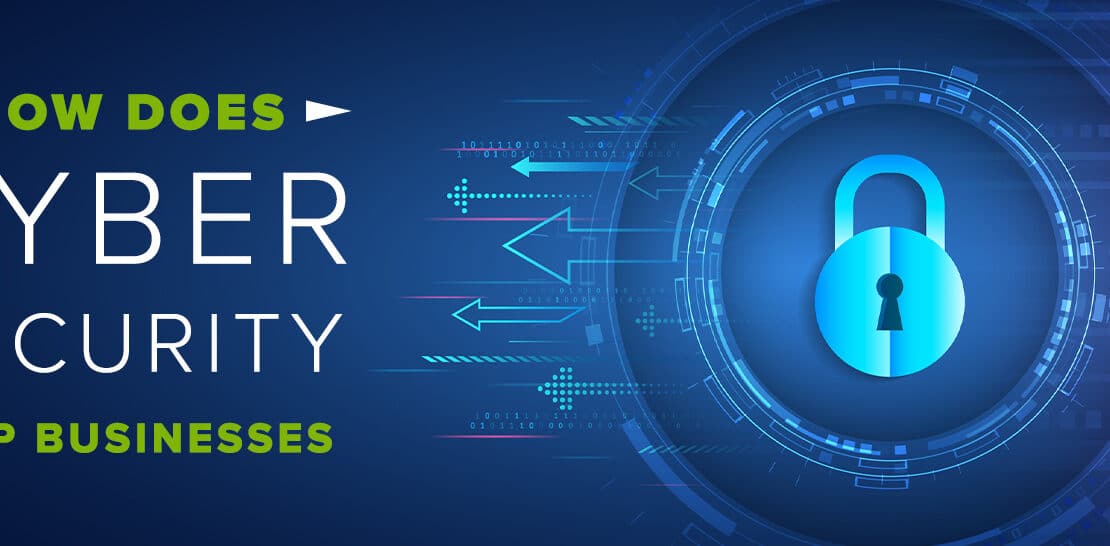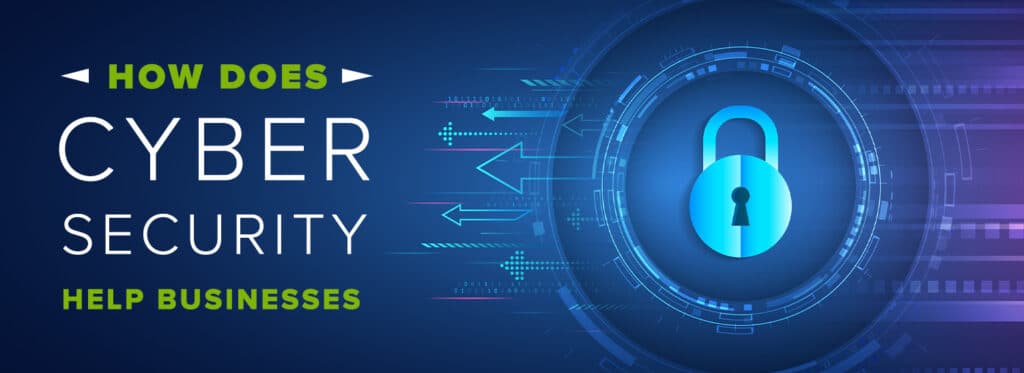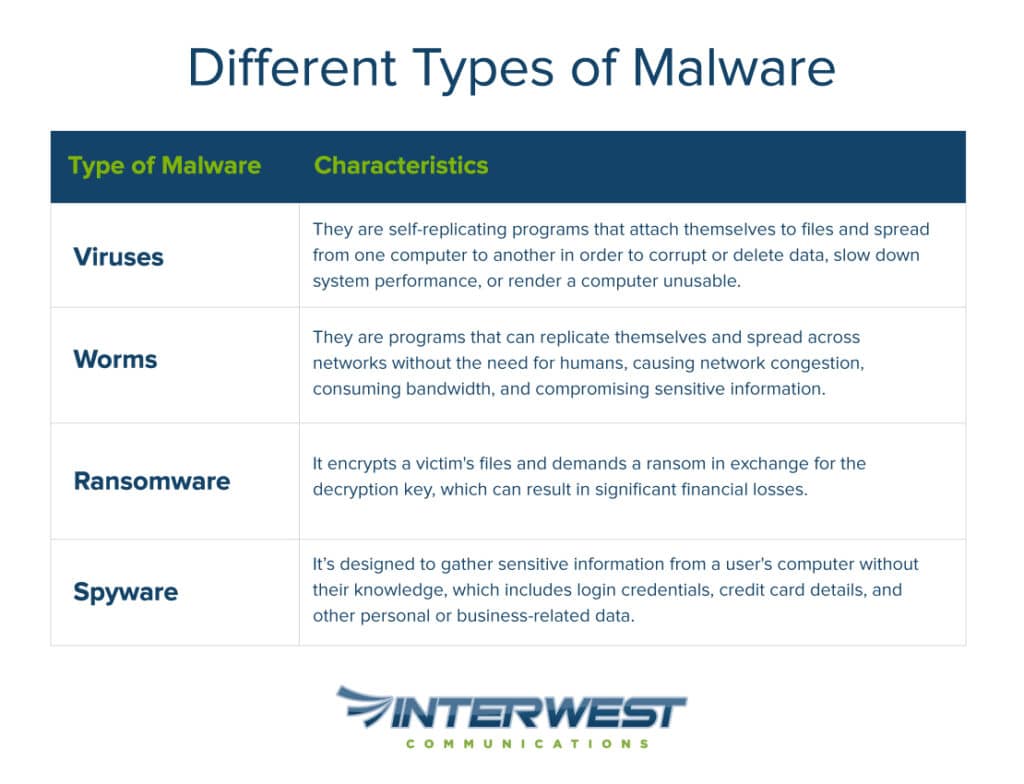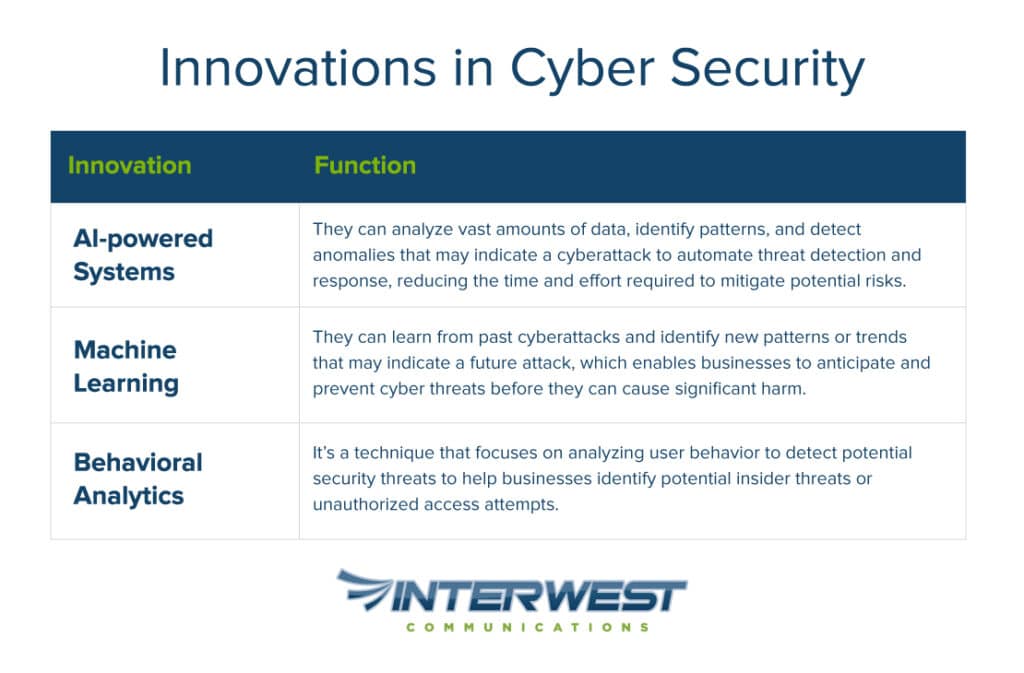- May 19, 2025
- Posted by: Interwest Communications Team
- Categories: News, Uncategorized

Originally posted on October 15, 2023 @ 9:10 pm

How Does Cyber Security Help Businesses?
With the increasing complexity and frequency of cyber threats, it is more crucial than ever for businesses to understand cyber security and the role it plays in safeguarding their operations and building customer trust.
By implementing effective cyber security measures, businesses can protect their sensitive information, which ensures its security and trustworthiness. So, in this article, we will take a look at everything you need to know so you can implement a killer cyber security system to protect your business from cyber threats. Let’s get into it!
What is Cyber Security?
Cyber security refers to the practice of protecting computer systems, networks, and data from unauthorized access, damage, or theft by applying various technologies, processes, and practices that are designed to prevent, detect, and respond to cyber threats.
However, to fully understand the importance of cyber security in today’s digital age, we need to take a deeper look into some of the crucial benefits that come with having a well-thought-out cyber security system.
The Importance of Cyber Security in Today’s Digital Age
In today’s interconnected world, where every aspect of business is digitized, the importance of cyber security cannot be understated, given that the increasing sophistication of cybercriminals has made businesses vulnerable to various types of cyber threats.
Organizations today face multiple cyber threats, including phishing attacks, malware incidents, and breaches of sensitive customer data. Without adequate protection, businesses risk losing sensitive information, facing financial losses, and damaging their reputation.
By implementing robust cyber security measures, organizations can minimize the risk of such disruptions and ensure the continuity of their business operations. However, to gain a clearer understanding of the importance of cyber security, let’s take a look at the roles they play in businesses.
The Roles of Cyber Security in Businesses
The role of a cyber security system in businesses is multifaceted. So let’s take a closer look at what having a cyber security system can do for your business, so you can assess if it’s the right move for you:
1) Data protection
The primary role of cyber security systems is to protect a business’s valuable information, which includes customer data, financial records, intellectual property, and trade secrets. They protect this data by instilling methods such as:
- Access controls, which help businesses limit access to specific data or systems based on the user’s role or level of authorization, reduce the risk of data breaches.
- Encryptions, which ensure that even if it is intercepted or stolen, it remains unreadable and unusable to unauthorized individuals, provide an additional layer of protection.
- Firewalls, intrusion detection systems, and other network security measures prevent unauthorized access and detect any suspicious activity in real-time.
With this amount of protection, businesses can rest assured that their sensitive information will only be visible to those with the authority to access it, preventing any loss of valuable resources.
2) Ensuring Business Continuity
By implementing robust cyber security measures, businesses can minimize the impact of such attacks and ensure the continuity of their operations. These measures include:
- Regular data backups ensure that even in the event of a cyberattack or data loss, they can quickly restore their systems and resume normal operations.
- Disaster recovery plans, which outline the steps and procedures to be followed in the event of a cyber incident, ensure that businesses can respond effectively.
- Incident response procedures, which can minimize the damage caused by an attack by ensuring a comprehensive and coordinated response,
By protecting valuable information and ensuring business continuity, effective cyber security measures help businesses maintain their competitive edge, safeguard their reputation, and protect their customers’ trust. So let’s take a look at some of these threats to better understand the topic.
The 2 Main Types of Cyber Threats Businesses Face
It is crucial for businesses to be aware of the different types of cyber threats they may face and take proactive measures to protect themselves. So let’s take a deeper dive into the main threats that businesses face today and how to proactively avoid them.
1) Malware Attacks
Malware, short for malicious software, refers to a variety of harmful programs that can infiltrate computer systems and cause significant damage. So let’s take a closer look at the types of malware attacks and how to proactively avoid them:

Furthermore, employees should be trained to recognize suspicious emails, avoid clicking on unknown links or downloading attachments from untrusted sources, and regularly back up their data to prevent data loss in the event of an attack.
2) Phishing Scams
Phishing scams involve fraudulent attempts to obtain sensitive information, such as passwords and credit card details, which are carried out through disguised emails or fake websites that mimic legitimate organizations, such as banks, social media platforms, or government agencies.
They typically contain urgent requests for personal information or ask recipients to click on a link that redirects them to a fake website designed to collect their data, which can result in identity theft, financial losses, and unauthorized access to sensitive business information.
To protect themselves against phishing scams, employees should be trained to look for red flags, such as spelling or grammatical errors, generic greetings, and requests for sensitive information.
Furthermore, security updates can help businesses stay one step ahead of these attacks by implementing multi-factor authentication, which adds an extra layer of security by requiring users to provide additional verification, such as a fingerprint or a unique code.
The 5 Main Measures to Protect Businesses From Cyber Threats
In today’s interconnected environment, where data breaches and cyber attacks are becoming increasingly common, it is imperative for businesses to implement robust security measures.. So let’s take a look at some measures that have been proven to be successful!
1) Implement Firewalls
Firewalls act as a barrier between trusted internal networks and external networks by monitoring and filtering incoming and outgoing network traffic to prevent unauthorized access to a business’s networks.
They can also be configured to block certain types of traffic or restrict access to specific websites, ensuring that employees adhere to the organization’s security policies and guidelines. However, this isn’t the only measure you can implement to protect your data.
2) Encrypt Sensitive Information
Encryption involves the process of converting information into an unreadable format, making it unintelligible to unauthorized individuals, to ensure that even if it falls into the wrong hands, it remains inaccessible and useless.
Modern encryption algorithms, such as the Advanced Encryption Standard, provide a high level of security and are widely adopted by businesses across various industries, given that they use complex mathematical functions to scramble the data, further enhancing the security.
3) Update Your System and Patches
Hackers often exploit system vulnerabilities to gain unauthorized access to a business’s network. To mitigate this risk, businesses should prioritize regular software updates and the application of security patches, eliminating the weaknesses that cybercriminals may exploit.
4) Monitor Your Network Traffic
By monitoring network traffic, system logs, and security events, businesses can detect and respond to potential threats in real-time, which allows them to identify any suspicious activities and take immediate action to prevent or minimize the impact of a cyberattack.
5) Establish an Incident Response Plan
Businesses should also establish a comprehensive incident response plan to effectively handle security incidents, which should outline the steps to be taken in the event of a breach, including containment, investigation, and recovery.
By implementing these measures and adopting a proactive approach to security, businesses can significantly reduce the risk of falling victim to cyberattacks. But these measures aren’t only instilled to protect a business’s sensitive information; they also help build customer trust.
The Impact of Cyber Security on Customer Trust
With the increasing prevalence of cyber threats, businesses must prioritize the protection of customer data to maintain trust and loyalty, which is not only a legal and ethical responsibility but also has a significant impact on the overall success of a business.
By implementing robust cyber security measures, businesses can protect customer data from breaches and demonstrate a commitment to privacy and security, which fosters trust and enhances customer loyalty.
A strong cyber security posture can also differentiate businesses from their competitors and position them at the forefront of their market, given that building a reputation for security can attract new customers and retain existing ones.
To ensure customer loyalty, businesses can obtain industry certifications, such as ISO 27001 and the Payment Card Industry Data Security Standard, to demonstrate that they have implemented robust security controls and follow the best industry practices.
Furthermore, businesses can regularly update their customers about the security measures in place and the steps taken to mitigate risks, which reassures customers that their data is a top priority for the business.
But now that we have understood what cyber security is, the threats that put it at risk, how to mitigate these risks, and why it is so crucial to have a killer cyber security system, let’s take a trip into the future to see what is in store for the cyber security of businesses.
The Future of Cyber Security in Business
The world of cyber security is constantly evolving to keep pace with emerging threats and businesses need to stay updated with advancements in technologies. So let’s take a deeper dive into what the future has in store for cyber security practices.

When to Hire a Cyber Security Professional
Cyber security professionals are responsible for designing and implementing security measures, conducting risk assessments, and responding to security incidents. With the increasing complexity of cyber attacks, businesses need professionals who are well-versed in the latest technologies and methodologies.
These professionals can help you develop, implement, and manage your cyber security measures effectively, given that they have a deep understanding of business operations, risk management, and regulatory compliance.
Protect Your Business From Cyber Threats
Cybersecurity plays a vital role in protecting businesses from a wide range of cyber threats. By understanding the basics of cyber security, businesses can implement measures to protect their valuable information, ensure business continuity, and build customer trust.
With the ever-evolving cyber threat landscape, businesses must stay vigilant, adopt best practices, and invest in emerging technologies to stay ahead of cyber criminals. Ultimately, by prioritizing cyber security, businesses can not only safeguard their operations but also gain a competitive edge in today’s digital business landscape.
